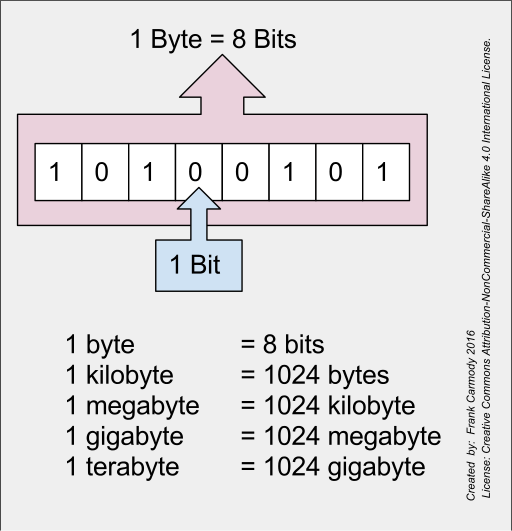Eight Bit Byte Mac OS
Was the same issue for me on Mac OS, I've ignored the file in code eventually, since it will get re-generated by the OS and I wasn't sure how safe it will be to permanently remove it. – Alon Eirew Oct 3 '18 at 14:25. Two situations are considered: 8-bit-clean environments (which can be assumed), and environments that forbid use of byte values that have the high bit set.
Scans the average Mac in under 30 seconds. Run the malware scanner in the background while you boot up your favorite game and it's done by the time you're ready to play. You can even customize your scans to run when you're not using your Mac at all, at any day, at any time.

Is your Mac up to date with the latest version of the Mac operating system? Is it using the version required by a product that you want to use with your Mac? Which versions are earlier (older) or later (newer, more recent)? To find out, learn which version is installed now.
If your macOS isn't up to date, you may be able to update to a later version.
Which macOS version is installed?
From the Apple menu in the corner of your screen, choose About This Mac. You should see the macOS name, such as macOS Big Sur, followed by its version number. If you need to know the build number as well, click the version number to see it.
Which macOS version is the latest?
These are all Mac operating systems, starting with the most recent. When a major new macOS is released, it gets a new name, such as macOS Big Sur. As updates that change the macOS version number become available, this article is updated to show the latest version of that macOS.
If your Mac is using an earlier version of any Mac operating system, you should install the latest Apple software updates, which can include important security updates and updates for the apps that are installed by macOS, such as Safari, Books, Messages, Mail, Music, Calendar, and Photos.
| macOS | Latest version |
|---|---|
| macOS Big Sur | 11.3 |
| macOS Catalina | 10.15.7 |
| macOS Mojave | 10.14.6 |
| macOS High Sierra | 10.13.6 |
| macOS Sierra | 10.12.6 |
| OS X El Capitan | 10.11.6 |
| OS X Yosemite | 10.10.5 |
| OS X Mavericks | 10.9.5 |
| OS X Mountain Lion | 10.8.5 |
| OS X Lion | 10.7.5 |
| Mac OS X Snow Leopard | 10.6.8 |
| Mac OS X Leopard | 10.5.8 |
| Mac OS X Tiger | 10.4.11 |
| Mac OS X Panther | 10.3.9 |
| Mac OS X Jaguar | 10.2.8 |
| Mac OS X Puma | 10.1.5 |
| Mac OS X Cheetah | 10.0.4 |
The size of a 'long' integer varies between architectures and operating systems.
Understanding Bits And Bytes
The Intel® Compiler is compatible and inter-operable with Microsoft* Visual C++ on Windows* and with gcc* on Linux* and Mac OS X*. Consequently, the sizes of fundamental types are the same as for these compilers. The size of a “long” integer in particular depends on the operating system and the targeted architecture as follows:
| OS | Architecture | Size of 'long' type |
| Windows | IA-32 | 4 bytes |
| Intel® 64 | 4 bytes | |
| Linux | IA-32 | 4 bytes |
| Intel® 64 | 8 bytes | |
| mac OS | Intel® 64 | 8 bytes |
Bits Bytes Chart
Consequently, when programs which use 'long' integer data type are ported from IA-32 Linux to Intel® 64 Linux, or from Intel® 64 Windows to Intel® 64 Linux, the behavior might change. (Note that the size of pointers is expected to change between IA-32 and Intel® 64).
In addition, the size of a 'long double' also varies by operating system.
Eight Bit Byte Mac Os X
On Windows*, the size is 8 bytes by default. On Linux or Mac OS X, 10 bytes are used for the representation of a long double, although the allocated size may be larger (12 bytes on IA-32 Linux; 16 bytes elsewhere).
Suggestion: If it is important to you for integer types to have the same size on all Intel platforms, then consider replacing 'long' by either 'int' or 'long long'. The size of the 'int' integer type is 4 bytes and the size of the 'long long' integer type is 8 bytes for all the above combinations of operating system and architecture.